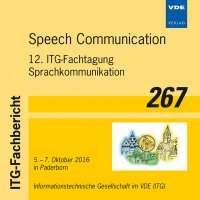Multiframe Echo Suppression Based on Orthogonal Signal Decompositions
Konferenz: Speech Communication - 12. ITG-Fachtagung Sprachkommunikation
05.10.2016 - 07.10.2016 in Paderborn, Deutschland
Tagungsband: Speech Communication
Seiten: 5Sprache: EnglischTyp: PDF
Persönliche VDE-Mitglieder erhalten auf diesen Artikel 10% Rabatt
Autoren:
Huang, Hai (IAIC Research Center, Northwestern Polytechnical University, Xi’an, Shaanxi 710072, China & Multimedia Communications and Signal Processing, University of Erlangen-Nuremberg, 91058 Erlangen, Germany)
Hofmann, Christian; Kellermann, Walter (Multimedia Communications and Signal Processing, University of Erlangen-Nuremberg, 91058 Erlangen, Germany)
Chen, Jingdong (IAIC Research Center, Northwestern Polytechnical University, Xi’an, Shaanxi 710072, China)
Benesty, Jacob (INRS-EMT, University of Quebec, Montreal, QC H5A 1K6, Canada)
Inhalt:
Acoustic echo arises due to the acoustic coupling between a loudspeaker and a microphone in a full-duplex voice communication device. Recently, the use of only acoustic echo suppression (AES) has been proposed without precise echo path estimation. In this paper, we propose an extension to the scheme of the multiframe Wiener filter. A non-parametric variable step-size (NPVSS) normalized-least-mean-square (NLMS) algorithm is used to estimate the echo signal in every STFT bin and time frame. Based on the orthogonal signal decompositions, we discuss how to form different echo suppression filters by optimizing different cost functions. We cover the design of the Wiener, MVDR, tradeoff, and LCMV filters. From a theoretical point of view, the Wiener and tradeoff filters are identical to the MVDR filter up to a scaling factor. Experimental results demonstrate that the developed filters can efficiently attenuate the undesired echo and the estimate near-end signal with little distortion.


